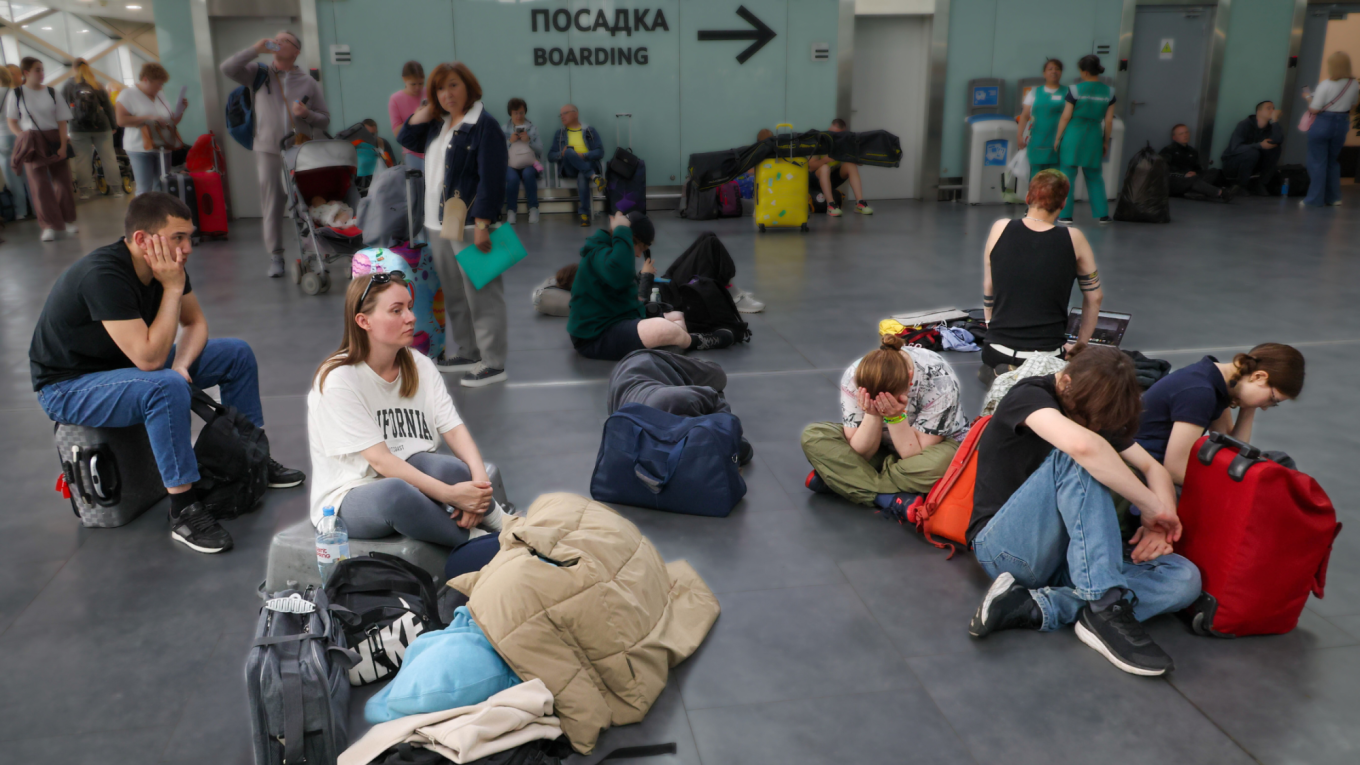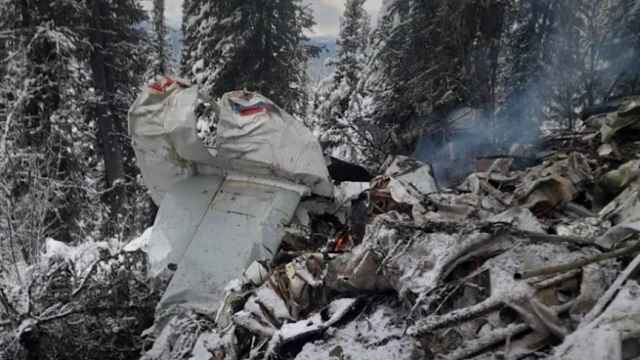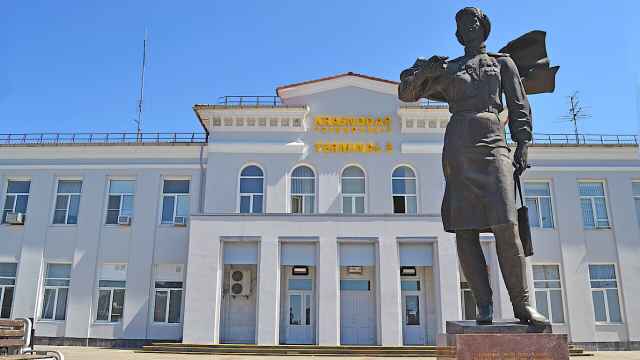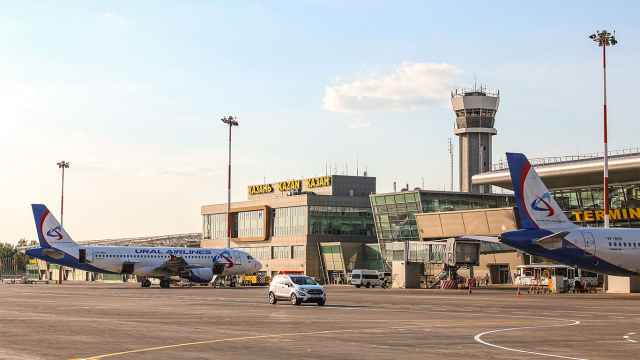Welcome to the latest edition of Regions Calling, a weekly newsletter by The Moscow Times bringing you insights and analysis on life and politics beyond Russia’s capital.
This week, MT’s Indigenous special correspondent Leyla Latypova explores how mass flight delays and frequent mobile internet outages transformed the lives of ordinary people in Russia’s regions.
Subscribe here so you never miss an issue.
Over the weekend, the threat of Ukrainian drones grounded at least 485 flights and delayed 1,900 more at airports across Russia.
While Moscow’s Sheremetyevo Airport, St. Petersburg’s Pulkovo Airport and Nizhny Novgorod’s Strigino Airport were hit the hardest by the wave of cancellations, the ripple effects were felt even in Russia’s Baltic exclave of Kaliningrad and as far east as Vladivostok.
The aviation collapse, which lasted from Saturday until the early hours of Monday, is estimated to have cost airlines around 20 billion rubles ($250 million) in damage, industry experts say.
To understand the gravity of the situation, it is important to keep in mind that Russia’s centralization of power is not limited to politics and business.
The transportation system of the world’s largest country is almost entirely dependent on Moscow, as air and train travel between some regions is impossible without a connection in the capital or St. Petersburg.
This remains true even for Russia’s ethnic republics, which were initially designed to be equal partner states within the federation.
Three of the 21 republics of Russia don’t have working airports at all. For the rest, most rely on connections with Moscow and operate only a few flights to other regions of the country, let alone international flights, according to a study by news outlet From the Republics.
Magas Airport in Russia’s North Caucasus republic of Ingushetia only operates flights to and from the Russian capital and Tatarstan’s Kazan International Airport remains a rare outlier used as a hub for cross-regional travel.
Train travel rarely offers a convenient alternative. Even the republic of Tatarstan’s capital Kazan and Bashkortostan’s Ufa, the two major economic hubs of the Volga-Ural region that are 450 kilometers apart, are not connected by a train line despite repeated demands by the many business travelers, tourists and families with work and family ties in the two regions.
So while passengers traveling between St. Petersburg and Moscow switched to trains, buying up nearly all remaining weekend tickets, those moving between other regions were often forced to wait for their flight or the next available connection in crowded airports.
“They’re supposed to refund everything, but since we bought the tickets separately — well, there’s no guarantee they’ll refund the Kazan leg,” a woman named Yulia told independent news outlet Sibir.Realii, a regional affiliate of Radio Free Europe/Radio Liberty (RFE/RL).
Yulia and her child were supposed to travel from the northwestern city of Murmansk to Nizhny Novgorod with a layover in Kazan, but her plans were put on hold by delays and cancellations at Kazan Airport, where disruptions continued well into Tuesday.
“I’m scouring websites in search of what can be done. Will we ever get [to Novgorod] at all?!” Yulia told journalists in the midst of the collapse.
Mass flight disruptions were coupled with mobile internet outages, which have become increasingly frequent since mid-June and now plague nearly every region of the country regardless of their proximity to the Ukrainian border, according to independent communications watchdog Na Svyazi.
A double disaster for travelers, the outage might have proven a blessing for airline carriers and tour companies.
Unlike the previous travel disruption in May, Russia’s Passengers’ Union didn’t record a spike in requests for legal help and assistance during flight delays and cancellations over the weekend, and internet disruptions could be among the key reasons for it, the union’s head Kirill Yankov told Kommersant.
Residents of multiple Russian regions who spoke with The Moscow Times said their life was thrown into disarray by internet outages even when they were not taking a major trip.
“On the one hand, I actually got some rest from all the calls and messages. On the other hand, it was difficult to buy anything [at the store] because the cash registers weren’t working,” a man from the southern city of Saratov told The Moscow Times on condition of anonymity.
A woman from Tambov, a city located some 400 kilometers southeast of Moscow, said: “The biggest inconveniences amid the outage were paying for purchases in stores, using public transport and communication in general.”
“Many stores put up notices on their doors warning that there might be connectivity issues and people should be prepared to pay in cash,” the woman told The Moscow Times, requesting anonymity due to safety concerns.
“I didn’t have any problems with navigation since the city is small and locals usually know every street. It’s more of an issue in Moscow,” she added.
In St. Petersburg, mobile internet disruptions began late on Friday amid the first reported drone attack and continued throughout the weekend.
Russia’s Defense Ministry reported shooting down more than 200 Ukrainian drones across the country over the weekend. On Monday, the ministry said it had downed 91 drones overnight, including eight over the Moscow region and three over the Leningrad region.
“I didn’t receive a single SMS warning of a drone attack throughout the weekend, just suddenly lost my mobile connection — that’s it,” said a woman from St. Petersburg.
“I was at a concert on Saturday, and the artist’s appearance was delayed by about 40 minutes, while the mobile signal kept being interrupted. It turned out there was an air raid alert [during that time] … and we had no idea about it,” the woman told The Moscow Times.
“I can’t say that I felt scared [for my safety], but I do have mixed feelings about it,” she added.
A Message from The Moscow Times:
Dear readers,
We are facing unprecedented challenges. Russia's Prosecutor General's Office has designated The Moscow Times as an "undesirable" organization, criminalizing our work and putting our staff at risk of prosecution. This follows our earlier unjust labeling as a "foreign agent."
These actions are direct attempts to silence independent journalism in Russia. The authorities claim our work "discredits the decisions of the Russian leadership." We see things differently: we strive to provide accurate, unbiased reporting on Russia.
We, the journalists of The Moscow Times, refuse to be silenced. But to continue our work, we need your help.
Your support, no matter how small, makes a world of difference. If you can, please support us monthly starting from just $2. It's quick to set up, and every contribution makes a significant impact.
By supporting The Moscow Times, you're defending open, independent journalism in the face of repression. Thank you for standing with us.
Remind me later.







